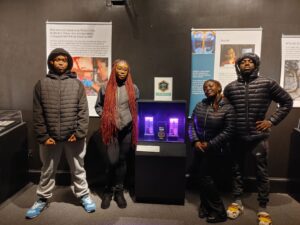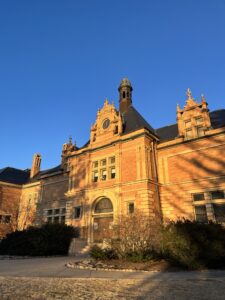By Kristen Curry:
Mission Space is one of the most popular programs at Roger Williams Park’s Museum of Natural History and Planetarium. This school-vacation program lets students blast off, build a land rover, learn about the solar system, and more.
This year, Director Renée Gamba is on a new mission: to bring more Providence school students and their teachers into the museum.
The museum welcomes thousands of visitors from all over the state, and beyond, all year long. During a recent week, students came from a homeschool group, Rhode Island School for the Deaf, Dartmouth Middle School, and Roger Williams University. But museum staff realized this past year that although the museum draws from far and wide, it has the lowest visits from schools and teachers in its home city of Providence. They are working with the Roger Williams Park Conservancy to change that.
Students and teachers alike were challenged by the isolation of the past few years in the pandemic; the museum is the perfect antidote to that and its team can work closely with teachers to support understanding in the classroom. The museum is always free to Providence school groups.
“We want to provide a true learning experience for teachers and students,” Renée says. “These students are our future.”
The museum offers teachers hands-on discovery-based learning and staff love hearing the sound of excited students in the museum; in fact, they welcome it.
Post-Covid, Renée says the museum is busier than ever. “Virtual technology is great and got us through the crisis,” she says, “but now, people want to get out and do. We are definitely seeing a boom here at the museum and heightened interest in hands-on education.”
Donna Casanova, Science Teacher Leader at Central High School, teaches Environmental Sciences and calls on the museum to give students real-world, in-time scientific opportunities. Donna says that the museum is an essential part of bringing 21st-century science and skills to Central’s classrooms. Working with the museum, her students grew and monitored carbon dioxide farms, thinking about ways to sustainably farm on this planet, or perhaps another. The carbon footprint might be low but student interest is high.
“Regardless of the grade you are teaching,” says Donna, “you will find a Next Generation Science Standard aligned to this experience. Let it be a visit from Renée, a lesson collaborated with Renée, or let it be a day-long adventure. Renée Gamba and her team at the Roger Williams Museum of Natural History will work with you to create a clear storyline and/or extended activity! Activities at the museum not only apply to science. There is history, literature, mathematical application and arts! They’re all found in a welcoming, safe, failure-free environment.”

Providence Central High School Students at the Museum of Natural History, photo courtesy of Donna Casanova
A visit to the museum lets students see how what they learn in the classroom connects to their community, state, nation, and globe.
Many teachers look to the museum — the only natural history museum and public planetarium in the state — for earth and space sciences. This spring the museum will feature an exhibit called Flight of the Dinosaurs: Cretaceous Birds, joining an existing exhibit, Seismic Shifts: Earth Through Time.
“We are part of the city of Providence and we want teachers to know this is a resource for them,” Renée says.
“It’s more than a field trip,” says Renée. “It’s more of a discovery trip. Dynamic discovery is what we like to call it. We can use our collections to respond to stories and cultures, help students understand the urban wildlife in their own yard. We love having students come here and see them get excited. Hands-on science experiences will help students be better, more thoughtful citizens.”
“Learning is fun!” Renée adds. “There’s no test or stress here.” She says that students and teachers alike want to do something interactive, that is fun and “minds-on, hands-on.”
And while the museum is rooted in the city, Renée and teachers like Donna Casanova hope that visiting it encourages their students to look beyond it, to the plants growing underneath their feet or the stars and skies overhead.
To create more opportunities for Providence public school students to learn and grow in this beautiful setting, the Roger Williams Park Conservancy and Providence Parks Department are partnering to create the new Roger Williams Access Fund. The Access Fund pays for bus transportation for Providence classes to the park; only about 15% of the parks educational offerings are currently used by Providence public schools. To launch the Access Fund, the Conservancy is excited to make this part of it’s upcoming 401 Gives Day, starting March 31, 2023. Be sure to mark your calendars and reach out to the Conservancy if you would like to help!
The museum is managed, programmed and operated by the Providence Parks Department; it is open seven days a week, free for Providence residents on the first Saturday of the month, or $2 a visit ($5 with a planetarium show). To learn more about the museum’s partnership with Providence schools, visit www.providenceri.gov/museum or contact rgamba@providenceri.gov.

